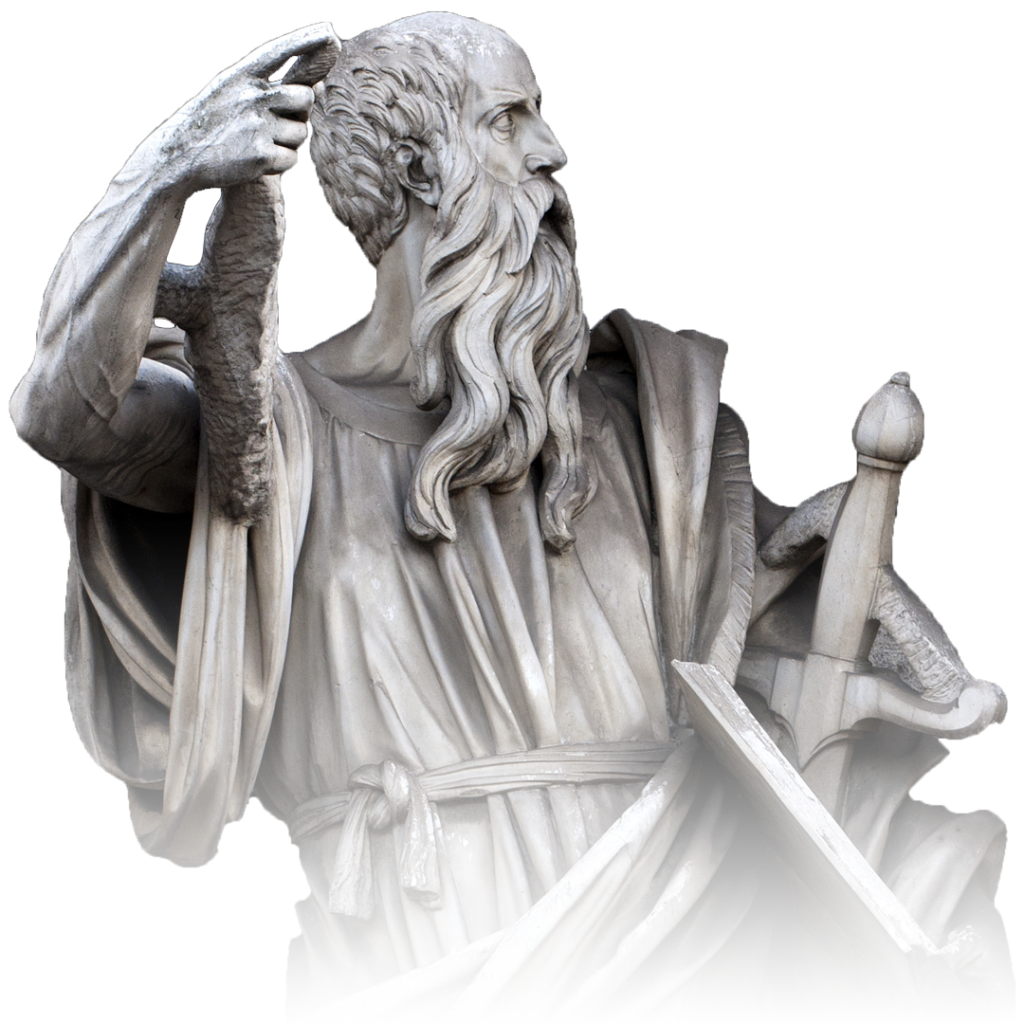- Jesus was copied from ancient gods of pagan cultures
- Gospels are unreliable
- too many coincidences
- Christianity derives from Hellenistic Judaism
- Jesus’s story is allegorical, not historical
- Paul describe Jesus as spiritual, not earthly
- no evidences from Romans or pagans
- Paul’s historical Jesus
- 4 biographies
- unexpected Messiah
- James the brother of Jesus
- better attested than 2 important figures
- 2 genealogies
- Jesus’ existence is defended by eyewitness
- evidence outside the New Testament
- archaeology
Jesus of Nazareth
The historical Jesus
Apollonius of Tyana (3-97 CE) was a contemporary of Jesus of Nazareth. He allegedly did the same things as Christ. But nobody believes the stuff written about him today. Behind the layers of myths and legends, there is certainly a historical man named Apollonius. What happened with him, we don’t know for sure. We don’t have enough sources to compare.
Today, there are 2 sides on the question of the historical Jesus from a secular point of view. Either Jesus was a myth and turn into into historical man (docetism), or a historical man turn into a divine Savior (Ebionism). For a Christian, the answer is clear: Jesus is God who took flesh and rose from the dead.
For people who hold the 2nd view, make a distinction between the “Jesus of history” (a crucified Jewish man) with the “Christ of faith” (resurrected miracle-worker). Those who take it to an extreme (mythicists) would even deny that a real Jesus of Nazareth doesn’t even exist.
Three minimal facts that are virtually accepted by all scholars of antiquity1, even the skeptical ones (Ehrman, Lüdemann, Casey, Crossan, etc):
Jesus was a Jewish man
Jesus was a preacher and teacher
Jesus was crucified
The first doubters

Licensed with GFDL and Creative Commons CC-BY-SA-3.0 and older versions (2.5, 2.0 and 1.0)
Author: Philippe Dessante (Wikipedia)
Everyone believed that a historical Jesus of Nazareth existed until the 18th century CE2. Before them, it was the docetists who deny the physical appearance of Jesus (probably as a respond against the fact that it was scandalous to crucified the God of the universe).
| Year | Author | Book | Argument |
| 1791 | Constantin François de Chasseboeuf, compte de Volney | Ruins of Empire | Christianity is just a variant of other religions |
| 1795 | Charles-François Dupuis | The Origin of All Religions | Jesus was an invention of a sun-god |
| 1840 | Bruno Bauer | Criticism of the Gospel History of John | Jesus is an invention of the Gospel writers (Christianity is Judaism + Stoicism) |
| 1883 | Gerald Massey | Ancient Egypt, the Light of the World | connection between Horus & Jesus |
| 1890 | James George Frazer | The Golden Bough |
* content coming from Bart Ehrman’s book “Did Jesus Exists? A Historical Argument For Jesus Of Nazareth”, page 14
Today, the leading scholars who defend the ‘Christ myth theory’ are Earl Doherty, Richard Carrier, Robert Price & Tom Harpur. While the mythicism position is espoused by a very few minority of scholars, it became one of the favorite argument to take down Christianity.
Jesus’ name
In the “Lexicon of Jewish Names in Late Antiquity”, the name of Jesus is positioned as the 6th most popular name amongst Palestinian men of the 1st century CE5.
And Nazareth is a real geographical place. Archeologists found it.
Therefore, a man of the 1st century CE named Jesus of Nazareth is historically possible.
Sources
Jesus’ existence is attested in early multiple independant sources, written within 100 years of his life. The four Gospels fit the category of Greco-Roman biographies8.
19 creedal statement
4 archeological evidence
17 non-Christian sources
5 other Christian sources
That would be a lot of independent sources if Jesus were only a non-historical being!
Paul & the Gospels
Paul
Scholars agree that Paul’s letters pre-dates the Gospels. But atheists complain that he doesn’t talk about the life of Jesus (virgin birth, miracles, the empty tomb, sayings, etc).
Since the first Christians believed that Jesus would return during their lifetime, it wasn’t expected to preserved a written record of his life if there will be nobody left to read it. For this reason, Paul doesn’t focus much on this subject.

Paul isn’t writing a biography but pastoral letters concerning theology, addressed to Christians who already knew the Gospel.
In his letter, the name “Jesus” appears more than 218 times, without counting other names like “Christ” or “Lord”9.
If Paul used to hate the Christians before his conversion, it doesn’t make sense that Jesus never existed to have Christians in the first place10.
- the Jewish ancestry of Jesus
(Gal 3:16) - his Davidic descent
(Rom 1:3) - his virgin birth
(Gal 4:4) - his life under Jewish law
(Gal 4:4) - the existence of His brothers
(1 Cor 9:5) - the existence of His 12 disciples
(1 Cor 15:7) - one of the disciples was named James
(1 Cor 15:7) - some of the disciples had wives
(1 Cor 9:5) - Paul know Peter & James
(Gal 1:18-2:16) - Jesus’ poverty
(2 Cor 8:9) - his meekness & gentleness
(2 Cor 10:1) - his abuse by others
(Rom 15:3) - his teachings on divorce and remarriage
(1 Cor 7:10-11) - his view on paying wages of ministers
(1 Cor 9:14) - his view on paying taxes
(Rom 13:67)
- his command to love one’s neighbors
(Rom 13:9) - his views on Jewish ceremonial uncleanness
(Rom 14:14) - his titles of deity
(Rom 1:3-4; 10:9) - his institution of the Lord’s Supper
(1 Cor 11:23-25) - his sinless life
(2 Cor 5:21) - his death on the cross
(Rom 4:25, 5:8, Gal 3:13) - his death paid for our sins
(1 Cor 15:3, 2 Cor 5:21) - his burial
(1 Cor 15:4) - his resurrection on the “third day”
(1 Cor 15:4) - his post-resurrection appearance to the apostles
(1 Cor 15:5-8) - his post-resurrection appearances to others, including 500 people, most of whom were still alive when Paul wrote 1 Corinthians
(1 Cor 15:6) - Jesus’ present position at God’s right hand
(Rom 8:34)
Paul’s source of information
Since Paul wasn’t an eyewitness of Jesus, he got his information from others (within 3 years of his conversion).

In Galatians 1:18, Paul used the Greek word ‘ἱστορῆσαι’ (historeó) to describe that his visit to Peter was intended to get information13.
- Rom 16:7 – Paul knew those who were “in Christ” before him
(baptized Christians) - 1 Cor 15:3-8 – Paul received a creed that was delivered to him
- Gal 1:18-19 – Paul met with Peter and James, the ‘brother’ of Jesus
(the word ‘brother’ can also mean a relative like a cousin)
Jesus & Greco-Roman figures
Within 100 years, there’s around hundreds of thousands of Jews living in Palestine. Only 1 is better attested than Jesus: Josephus (the historian). The two most powerful men in Judea at the time of Jesus were Caiaphas (Jewish high priest) & Pontius Pilate (the Roman governor of Judea).
Caiaphas

Caiaphas is only briefly mentioned in the 4 Gospels & Josephus14, with a few archeological discoveries
Pontius Pilate

Pontius Pilate is only briefly mentioned by the 4 Gospels, 1 Timothy, Josephus, Tacitus, Philo & few archeological discoveries (stone & ring)15
The two of them don’t have any biographical record. Does that mean they doesn’t exist? Absolutely not!
How come Jesus, a poor & marginalized man of Nazareth, end up having four biographies? If we have to compare his amount of documentation, he would easily match the elites of antiquity.
Take Emperor Tiberius (42 BCE – 37 CE) for example. He has 4 biographies as well: Velleius Paterculus, Tacitus, Suetonius, Cassius Dio16. And he surely existed.
| Caiaphas | Pontius Pilate | Tiberius | Alexander | Jesus | |
| Biographies | 0 | 0 | 4 | 2 | 4 |
The Greek’s greatest conqueror of all time, Alexander the Great only has 2 biographies, written 400 years later, by Plutarch (46 – 120 CE) & Arrian (86 – 160 CE). And nobody questions his existence.
“(…) the amount of text we have about Jesus is good relative to one of the best-known figures from antiquity.” 17
Peter J. Williams
Contrast that to the Gospels, they are only less than 60 years after Jesus’ death.
There’s no doubt that a historical Jesus did exist.
Jesus’s ancestors
New Testament
We have five independent sources for Jesus’ lineage back to David, dated within 100 years of Jesus’ death. Genealogies are part of the ancient Greco-Roman biography genre18.
Paul & Acts included ancient creeds that mention that Jesus is a descendant of David19.
| Matthew 1:1 | Luke 3:23 |
| The book of the genealogy of Jesus Christ, the son of David, the son of Abraham… | When Jesus began his ministry he was about thirty years of age. He was the son, as was thought, of Joseph, the son of Heli,… |
Enemy attestations
1
Celsus (2nd century CE), a Greek philosopher who hated Christianity, agrees that Jesus was born from a Jewish woman20.
2
Marcion (85 – 160 CE) attempted to remove the 2 genealogies to fit his own ideology of a mythic Jesus.
“Besides this, he (Marcion) mutilates the Gospel which is according to Luke, removing all that is written respecting the generation of the Lord, and setting aside a great deal of the teaching of the Lord, …” 21
Irenaeus of Lyon
Jesus had relatives
Jesus has a ‘brother’ named James & a cousin named John the Baptist.
Atheists argue that the word ‘brother’ only means a baptized Christian. That’s because, through baptism, we became adopted sons & daughters of God by entering into his new covenant (Eph 1:5).
“Erastus, the city treasurer, and our brother Quartus greet you.”
Romans 16:23
“Now in regard to our brother Apollos, I urged him strongly to go to you with the brothers…”
1 Corinthians 16:12
But Paul makes the difference between a family member & baptized Christian by using only 2 times both the word “brother” (adelphós) & “Lord” (kyrio) together.
“…as do the rest of the apostles, and the brothers of the Lord, and Cephas?”
1 Corinthians 9:5
“But I saw none of the other apostles, except James the Lord’s brother.”
Galatians 1:19
Why did he mention “the” brother and not “a” brother? Think about it!
Moreover, the Greek word “ἀδελφοῖς” (adelphós) can mean a close relative (brother or cousin)24. In 1 Corinthians 15:6, Jesus appears to 500 brothers at the same time. Does it mean that Mary, the mother of Jesus, gave birth to 500 men?
Moreover, Josephus tells us that James was the biological cousin of Jesus.
If James, John or Peter never met a man named Jesus, they would know it.
The Messiah

Jews expected a warrior-type Messiah like King David to deliver them from the Romans who oppressed them, not a crucified Messiah!
If Jesus was a Christian invention, why would they create a Messiah that is completely different from the Jewish expectations? On the contrary, the fact that He was totally different from what people would think, is a clear indication that He wasn’t made up.
Paul doesn’t talk about God being crucified, but it was Christ (translated as Messiah) who was crucified (1 Cor 2:2, 15:3). It wasn’t expected that the Messiah shamefully died on the cross. If Christians made up the story, they wouldn’t have preached a crucified Messiah to appeal to the Jews.
Most people who don’t study the field don’t have a clue who these men were:
Nobody hear of them because they were failed Messiah. And we know they are historical people. If Jesus didn’t exist, why he would still be remembered today? Like the previous argument, if Caiaphas & Pontius Pilate didn’t have any biography written, why would Jesus have four of them (more than Alexander the Great)?
If Jesus didn’t exist, why would He suddenly got so many followers, and hatred from the Jews?
In the flesh or ghost?
The rise of docetism would have naturally taken form at a period of time where the eyewitness would have been dying out, and the openness to converts from the Gentile world would have shaped some new ideas in Christianity. For example, Paul, when alive, corrected the Corinthians of their wrong belief (ca. 56 CE). In Matthew & Luke’s Gospel (80s CE), there is no sign of polemic against docetism. It was only clear in John (90s CE). Certainly, the primitive Church would have taken the existence of a physical Jesus literally.

Against the docetists & Gnostic
Not everyone believed in a human Jesus in the early Church. And trust me, believing that Jesus is both 100% God & 100% man isn’t an easy task. That shed a lot of confusing interpretation of who Jesus was. For example, the Apostle John (who followed Jesus during his ministry) wrote his Gospel & letters against Cerinthus, Nicolaitans & his early Gnostics34 to refute their idea of a mystical Jesus (not in the flesh). The reasons: first, they weren’t eyewitness like the Jews, and second, they have a Neo-Platonic view of the world, which explain their rejection of the material world.
“And the Word became flesh and made his dwelling among us, (…) “
John 1:14
” (…) every spirit that acknowledges Jesus Christ come in the flesh belongs to God, and every spirit that does not acknowledge Jesus does not belong to God.”
1 John 4:2
“Many deceivers have gone out into the world, those who do not acknowledge Jesus Christ as coming in the flesh; such is the deceitful one and the antichrist.”
2 John 1:7
“(…) you hate the works of the Nicolaitans, which I also hate.”
Revelation 2:6
Paul also stress several passages in his letters to combat this false view of Jesus.
- 1 Tim 4:1-5 – false teachers that reject marriage & the Eucharist *
- 1 Tim 6:20 – avoid the absurdity of so-called ‘knowledge’
- 1 Cor 15 – the Corinthians believed only in a spiritual resurrection, not a physical one 35
* The docetists / Gnostics are known to reject the material world, and since the sacraments are visible signs of the invisible world, it is comprehensible that they also reject them.
Evidence outside of the New Testament
“Jesus did exist, whether we like it or not.” 36
Bart D. Ehrman
Recommended books
- Bart D. Ehrman – “Did Jesus exist? The historical argument for Jesus of Nazareth”
- Brant Pitre – “The Case for Jesus : the biblical and historical evidence for Christ”
- Gary Habermas – “The Historical Jesus: ancient evidence for the life of Christ”
- Lee Strobel – “The Case for Christ : a journalist’s personal investigation of the evidence for Jesus”
- Bart D. Ehrman, “Did Jesus exist? the historical argument for Jesus of Nazareth”, (New York: Harper One, 2012), 12
- Bart D. Ehrman, “Did Jesus exist? the historical argument for Jesus of Nazareth”, (New York:HarperOne, 2012),14
- Bart D. Ehrman, “Did Jesus exist? the historical argument for Jesus of Nazareth”, (New York: HarperOne, 2012), 336
- Maurice Casey, “Jesus: Evidence and Argument or Mythicist Myths?”, (Bloomsbury T&T Clark, 2014), 243
- Tal Ilan, Lexicon of Jewish Names in Late Antiquity: Palestine 330 BCE – 200 CE (Texts & Studies in Ancient Judaism, 91), 2002
- Gary R. Habermas, “The Historical Jesus: Ancient Evidence For The Life Of Christ”, (Joplin, MS: College Press Publishing Company, 1996), 250
- 1 Cor 15:3-5, Phil 2:6-11, Acts 2:22-40
- Richard A. Burridge, “What are the Gospels? A comparison with Graeco-Roman biography” (Baylor University Press, 2018)
- James Strong, “The New Strong’s Exhaustive Concordance of the Bible”, (Nashville, TN: Nelson, 2001), 453
- Bart D. Ehrman, “Did Jesus exist? the historical argument for Jesus of Nazareth”, (New York: HarperOne, 2012), 85
- Joseph M. Holden & Norman Geisler, “The popular handbook of archeology and the Bible: discoveries that confirm the reliability of Scripture”, (Harvest House Publishers, 2013), 137
- J.P. Moreland, “Scaling the secular city: a defense of Christianity”, (Baker Academic, 1987), 148-149
- Craig A. Evans, “Jesus and his world: the archeological evidence”, (Westminster John Knox Press, 2012), 6
- Josephus, “Antiquities of the Jews”
- Bart D. Ehrman, “Did Jesus exist? The historical argument for the existence of Jesus of Nazareth”, (HarperCollins, 2012), 43
- Peter J. Williams, “Can We Trust The Gospels?”, (Crossway, 2018), 40
- Peter J. Williams, “Can We Trust The Gospels?”, (Crossway, 2018), 42
- Richard A. Burridge, “What are the Gospels? a comparison with Graeco-Roman biography”, (Baylor University Press, 2018), 173
- Rom 1:3, 2 Tim 2:8, Acts 13:22-23
- Celsus, “The True Word” – quoted by Origen in his book “Contra Celsum”
- Irenaeus, “Against Heresies”, book 1, chapter 27
- Matthew, Mark, Luke, Paul’s Epistles, Acts, Josephus, Hegesippus, Eusebius, Clement of Alexandria, Jerome, Epiphanius
- Matthew, Mark, Luke, John, Josephus
- Rom 9:3, Mt 5:22-24, Mk 6:17-18, Gen 29:12; 24:48
- Cassius Dio, “Roman History”, 69.12-14 and Justin Martyr, “First Apology”, 31
- Acts 8:9 and Irenaeus, “Against Heresies”
- Josephus, “Antiquities of the Jews”, 7.25-36, 153-154
- Josephus, “Antiquities of the Jews”, 18.85-87
- Josephus, “Antiquities of the Jews”, 6.289-309
- Acts 5:36 and Josephus, “Antiquities of the Jews, 20.97-99”
- Acts 21:38 and Josephus, “The Jewish War”, 2.261-262
- Acts 5:37 and Josephus, “Antiquities of the Jews”, 18.4-10, 23-25
- Acts 5:37 and Josephus, “Antiquities of the Jews”, 5.510
- Irenaeus, “Against Heresies”, book 3, chapter 11, article 1
- Bart D. Ehrman, “How Jesus Became God: The Exaltation Of A Jewish Preacher From Galilee”, (HarperOne, 2014), 175
- Bart D. Ehrman, “Did Jesus Exist?: The Historical Argument for Jesus of Nazareth”, (HarperCollins, 2012), 338


Pingback: Can I trust the Gospels? – Minh Nhat Le